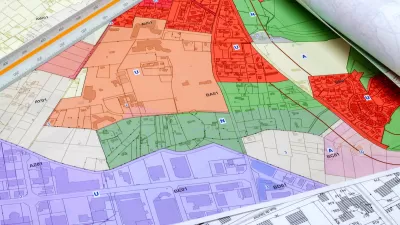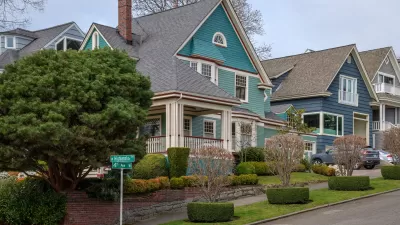With the new zoning code, Frederick aims to shift away from use-based zoning regulations.

The City of Frederick, Maryland is introducing its first draft form-based code, described in a press release as “a zoning regulation that guides how developments and buildings relate to the public realm first, and only secondarily to what uses occur inside them.”
Form-based codes differ from more traditional zoning codes by focusing on the form of buildings rather than their use. As explained in this Planopedia entry, “Form-based codes address the relationship between building facades and the public realm, the form and mass of buildings in relation to one another, and the scale and types of streets and blocks.” Form-based codes are designed to create a sense of place and promote walkability and compact development.
For Frederick, goals for the new code include:
- “Promote high-quality structures, streetscape, urban design public realm within an urban context.”
- “Encourage all development types for a unified and attractive environment.”
- “Promote differentiated and unique ideas that can provide a sense of place and destination while encouraging new and expanded development in the corridor.”
The city is encouraging the public to provide feedback on the draft code and will hold a series of public meetings.
FULL STORY: City publishes first draft of form-based code

Maui's Vacation Rental Debate Turns Ugly
Verbal attacks, misinformation campaigns and fistfights plague a high-stakes debate to convert thousands of vacation rentals into long-term housing.

Planetizen Federal Action Tracker
A weekly monitor of how Trump’s orders and actions are impacting planners and planning in America.

In Urban Planning, AI Prompting Could be the New Design Thinking
Creativity has long been key to great urban design. What if we see AI as our new creative partner?

King County Supportive Housing Program Offers Hope for Unhoused Residents
The county is taking a ‘Housing First’ approach that prioritizes getting people into housing, then offering wraparound supportive services.

Researchers Use AI to Get Clearer Picture of US Housing
Analysts are using artificial intelligence to supercharge their research by allowing them to comb through data faster. Though these AI tools can be error prone, they save time and housing researchers are optimistic about the future.

Making Shared Micromobility More Inclusive
Cities and shared mobility system operators can do more to include people with disabilities in planning and operations, per a new report.
Urban Design for Planners 1: Software Tools
This six-course series explores essential urban design concepts using open source software and equips planners with the tools they need to participate fully in the urban design process.
Planning for Universal Design
Learn the tools for implementing Universal Design in planning regulations.
planning NEXT
Appalachian Highlands Housing Partners
Mpact (founded as Rail~Volution)
City of Camden Redevelopment Agency
City of Astoria
City of Portland
City of Laramie





























